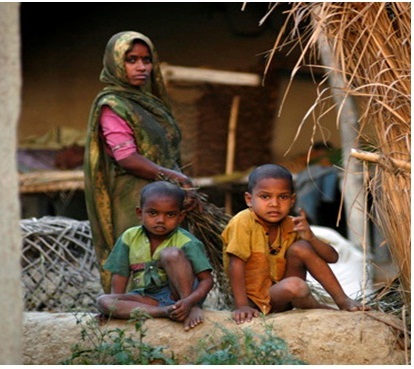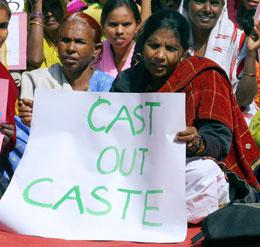Overview of Dalit Human Rights Situation
Over one-sixth of India's population, some 170 million people, live a precarious existence, shunned by much of Indian society because of their rank as “untouchables” or Dalits—literally meaning “broken” people—at the bottom of India's caste system. Dalits are discriminated against, denied access to land and basic resources, forced to work in degrading conditions, and routinely abused at the hands of police and dominant-caste groups that enjoy the state's protection.

Historically, the caste system has formed the social and economic framework for the life of the people of India. In its essential form, this caste system involves the division of people into a hierarchy of unequal social groups where basic rights and duties are assigned based on birth and are not subject to change. Dalits are ‘outcastes’ falling outside the traditional four classes of Brahmin, Kshatriya, Vaishya, & Shudra. Dalits are typically considered low, impure & polluting based on their birth and traditional occupation, thus they face multiple forms of discrimination, violence, and exclusion from the rest of society.
Beginning in the 1920s, various social, religious and political movements rose up in India against the caste system and in support of the human rights of the Dalit community. In 1950, the Constitution of India was adopted, and largely due to the influence of Dr. B.R. Ambedkar (chairman of the constitutional drafting committee), it departed from the norms and traditions of the caste system in favour of Justice, Equality, Liberty, and Fraternity, guaranteeing all citizens basic human rights regardless of caste, creed, gender, or ethnicity. The implementation and enforcement of these principles has, unfortunately, been an abysmal failure.
Despite the fact that “untouched ability” was abolished under India's constitution in 1950, the practice of “untouched ability”—the imposition of social disabilities on persons by reason of their birth in certain castes— remains very much a part of rural India. “Untouchables” may not use the same wells, visit the same temples, drink from the same cups in tea stalls, or lay claim to land that is legally theirs. Dalit children are frequently made to sit in the back of classrooms, and communities as a whole are made to perform degrading rituals in the name of caste. Most Dalits continue to live in extreme poverty, without land or opportunities for better employment or education. With the exception of a small minority who have benefited from India’s policy of quotas in education and government jobs, Dalits are relegated to the most menial of tasks, as manual scavengers, removers of human waste and dead animals, leather workers, street sweepers, and cobblers. Dalit children make up the majority of those sold into bondage to pay off debts to dominant-caste creditors.

Dalit women face the triple burden of caste, class, and gender. Dalit girls have been forced to become prostitutes for dominant-caste patrons and village priests. Sexual abuse and other forms of violence against women are used by landlords and the police to inflict political “lessons” and crush dissent within the community. Less than 1% of the perpetrators of crimes against Dalit women are ever convicted.
The plight of India's “untouchables” elicits only sporadic attention within the country. Public outrage over large-scale incidents of violence or particularly egregious examples of discrimination fades quickly, and the state is under little pressure to undertake more meaningful reforms. Laws granting Dalits special consideration for government jobs and education reach only a small percentage of those they are meant to benefit. Laws designed to ensure that Dalits enjoy equal rights and protections have seldom been enforced. Instead, police refuse to register complaints about violations of the law and rarely prosecute those responsible for abuses that range from murder and rape to exploitative labour practices and forced displacement from Dalit lands and homes. Laws and government policies on land reform and budget allocations for the economic empowerment of the Dalit community remain largely unimplemented.
Dalits who dare to challenge the social order have often been subject to abuses by their dominant-caste neighbors. Dalit villages are collectively penalized for individual “transgressions” through social boycotts, including loss of employment and access to water, grazing lands, and ration shops. For most Dalits in rural India who earn less than a subsistence living as agricultural labourers, a social boycott may mean destitution and starvation.
The present time is an historic moment, not only for Dalits, but for all those committed to basic human rights and principles of justice, equality, liberty, fraternity. India, a rising star and increasingly important player on the world stage, must not be allowed to ignore the injustice and oppression within its own borders any longer. Together, we must unite, nationally and internationally, to force the Indian government to rise above an entrenched caste-mentality and to properly enforce its laws, implement its policies, and fulfil its responsibility to protect the basic human rights of ALL of its citizens.
Among the Dalit community and its supporters & sympathizers, Dr. Ambedkar’s statement resounds louder today than ever: "My final words of advice to you are educate, agitate and organize; have faith in yourself. With justice on our side I do not see how we can lose our battle. The battle to me is a matter of joy. The battle is in the fullest sense spiritual. There is nothing material or social in it. For ours is a battle not for wealth or for power. It is battle for freedom. It is the battle of reclamation of human personality. It is in the fullest sense spiritual. There is nothing material or social in it. For ours is a battle not for wealth or for power. It is a battle for freedom. It is a battle for the reclamation of human personality."



